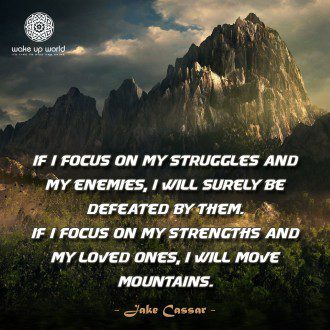Contributing writer for Wake Up World
When it comes to self-improvement, there’s an underlying idea that we are inherently flawed and need “fixing.” In the U.S. alone, self-help is a $12 billion a year industry, indicating that we are, in fact, a nation that is perpetually dissatisfied with who we are, warts and all. Even worse, when we discover that human nature is stubborn — and rarely willing to commit to fundamental change over the long haul — depression soon follows as our self-help bubble bursts. Eventually, yet another self-improvement crusade begins. While this vicious cycle is beneficial for the pocketbooks of self-help authors, gurus and seminar organizers, it fails to ultimately help individuals create happier, more joyful lives.
Psychologists have noticed this stark trend and switched gears to explore what actually does work to boost confidence, increase productivity, foster clarity and help one achieve life goals. Surprisingly, the trick is to emphasize strengths and build upon on them, instead of focusing on ‘repairing’ weak spots.
[pro_ad_display_adzone id=”110028″]
The dark side of the self-help industry
A study in Psychological Science found positive self-improvement statements like “I am a lovable person”, “I will succeed” or “I accept myself completely” can elicit negative thoughts in those with low self-esteem. The psychologists measured participants moods and current feeling of themselves after repeating one of the self-help phrases. Those with low self-esteem felt worse after repeating the statement compared to another low self-esteem group who did not. Participants with high self-esteem felt better after repeating the positive self-statement — but not by much. The team concluded, “Repeating positive self-statements may benefit certain people [such as individuals with high self-esteem] but backfire for the very people who need them the most.”
Perhaps it’s time we set aside positive affirmations and venture into a whole new territory of acceptance.
Maybe the Buddha was right
Through years of training in Buddhism, I’ve found all the teachings distill down to one simple idea: unconditional acceptance. Now, this doesn’t mean you become a doormat or don’t intervene in preventing harm. Instead it means to be so fully present with where we are at any given moment that we don’t resist life at all. We drop the story swirling around in our head and meet life as it truly is. We are both relaxed and alert — and very, very clear. We see past limited (and oftentimes inaccurate) perspectives — which includes parts of ourselves that we don’t like. Here’s the irony. Once we fully, compassionately and lovingly accept ourselves, all the “unskillful” aspects naturally fall away. We bring our strengths into the forefront, which ultimately make us more effective in the world.
Easier said than done, especially since we seem to be wired to focus on the negative. Some say this is a leftover from our survival days, where we needed to anticipate potential dangers like large predators or rival clans or scarcity of food. Since humans can be overwhelmingly creative, once the threat to survival was minimized through modern civilization, we then turned this negative thinking upon ourselves, looking for ways to improve disagreeable bits. But we’ve gone about it in the wrong way. You know the saying, whatever we focus on grows larger. So by placing undue attention on our flaws, we’ve essentially made these undesirable traits more pronounced. Science seems to agree.
Positive interventions
Research has shown, time and again, people generally have a firmly rooted belief that weaknesses are more “changeable” than strengths. The problem is we usually end up wasting time attempting to rid ourselves of a bad habit or perceived character flaw. New Year’s resolutions are a perfect example of how we set out with the best of intentions, only to fail not long after. Psychologists have found that “false hope syndrome” is quite common among those who embark on self-improvement, where they overestimate their capacity to change poor habits and set unrealistic goals. Moreover, according to Scientific American, the “further away someone was from who they wanted to be, the more they believed they could change themselves to become like this ideal person.”
Luckily, researchers are also studying what they call “positive interventions,” programs that help people uncover, explore and practice their strengths. Participants in one such program took a test to identify their top five character strengths, and then were instructed to use each of these strengths in a new way each day of the week. The research team found at the end of six months that those who practiced their strengths in this way were less depressed and happier.
[pro_ad_display_adzone id=”110030″]
Ignoring our strengths can also lead to negative consequences. We may assume our strengths are permanent and not in need of attention. This creates a situation where we miss the chance to reinforce our positive qualities. Take for example someone who feels they are kind. He or she may not seize the opportunity to cultivate greater levels of kindness — like extending themselves to a person in need or volunteering. They might let the characteristic of kindness slip over time and actually become less kind overall. If we don’t intentionally engage with our strengths, there’s a very good chance they will fade. One way to avoid this trap is to actively focus on just 1 or 2 strengths at a time, which will give an immediate positive feedback loop without diluting the gains. Another way is to develop further an already strong skill. Not only will be happier by bolstering our strengths instead of correcting our weaknesses, but we’ll also have more fun in the process.
Article sources:
- www.michaelmurphypsychologies.com/seligman05ppprogressarticle.pdf [PDF]
- www.scientificamerican.com/article/a-self-improvement-secret-work-on-strengths/?utm_content=buffer9a446&utm_medium=social&utm_source=facebook.com&utm_campaign=buffer
- www.forbes.com/sites/actiontrumpseverything/2013/07/10/forget-about-working-on-your-weakness-play-to-your-strengths-your-overwhelming-reaction/#34d7c7d33565
- www.forbes.com/sites/quora/2016/01/06/how-to-focus-on-your-strengths-instead-of-your-weaknesses/#6ad7d59a526a
- www.sciencedaily.com/releases/2009/07/090702110503.htm
About the author:
 Carolanne Wright enthusiastically believes if we want to see change in the world, we need to be the change. As a nutritionist, natural foods chef and wellness coach, Carolanne has encouraged others to embrace a healthy lifestyle of organic living, gratefulness and joyful orientation for over 13 years.
Carolanne Wright enthusiastically believes if we want to see change in the world, we need to be the change. As a nutritionist, natural foods chef and wellness coach, Carolanne has encouraged others to embrace a healthy lifestyle of organic living, gratefulness and joyful orientation for over 13 years.
Through her website Thrive-Living.net, she looks forward to connecting with other like-minded people from around the world who share a similar vision. You can also follow Carolanne on Facebook, Twitter and Pinterest.
Further reading from Carolanne Wright:
- The Most Eco-Friendly Nation on the Planet is Now Carbon Negative
- Plastic Waste in the Ocean Will Outnumber Fish by 2050
- Mind Control, Subliminal Messages and the Brainwashing of America
- Monsanto Charged with Crimes Against Nature and Humanity – Set to Stand Trial in 2016
- Plastic-Eating Mushroom Discovered in the Amazon Rainforest — A Solution for Our Trash Saturated World?
- Over 100 Scientific Studies Agree: Cannabis Annihilates Cancer
- Why Every Parent Should Consider Unschooling
- First U.S. City Produces More Electricity Than It Uses — With 100% Renewable Technology
- If You Care About Animals and the Earth, Here’s Why You Need to Boycott Palm Oil Immediately
[pro_ad_display_adzone id=”110027″]







